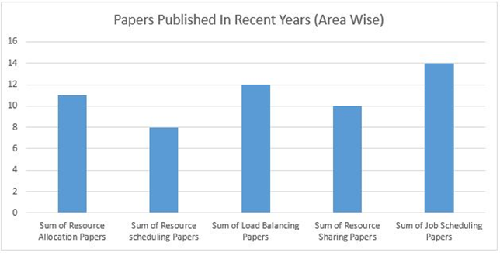


Indian Journal of Science and Technology
Year: 2020, Volume: 13, Issue: 24, Pages: 2418-2435
Systematic Review
Siraj Munir1*, Syed Imran Jami1
1Computer Science Department, Muhammad Ali Jinnah University, Karachi, Pakistan
*Corresponding author
Email: [email protected]
Received Date:02 May 2020, Accepted Date:10 June 2020, Published Date:08 July 2020
Objectives: This work reviewed the latest, state-of-the-art works in the area of Cloud Computing to help researchers, developers and stakeholders in decisionmaking. Method: The reviewed works are filtered after the rigorous process by using renowned indexing database of ACM and IEEE along with the subject based journals on Cloud Computing of international repute. These papers are further filtered by selecting papers published in last 4 years only. Our initial findings lead our reviews to five major areas of Cloud Computing including Load balancing, resource scheduling, resource allocation, resource sharing, and job scheduling. In this work we have limited ourselves to only technical aspects of cloud computing while excluding areas of security, privacy and economics (for example CapEx). We have presented our findings in the form of tables and graphs showing trends in Cloud Computing towards research community on the basis of five aspects as mentioned above. Findings: Our findings show that researchers are working in the area of Job Scheduling while low attention has been given in Resource Scheduling. Moreover, an open source robust framework for research community is needed covering all the aspects shown above for running experiments. Currently these features are available in commercial and proprietary frameworks including Amazon Web Service, Microsoft Azure, and Google Cloud Platform.
Keywords: Load balancing; resource scheduling; resource allocation; cloud computing; resource sharing; job scheduling
© 2020 Munir, Jami. This is an open-access article distributed under the terms of the Creative Commons Attribution License, which permits unrestricted use, distribution, and reproduction in any medium, provided the original author and source are credited.
Published By Indian Society for Education and Environment (iSee)
Subscribe now for latest articles and news.